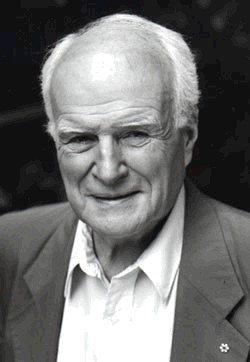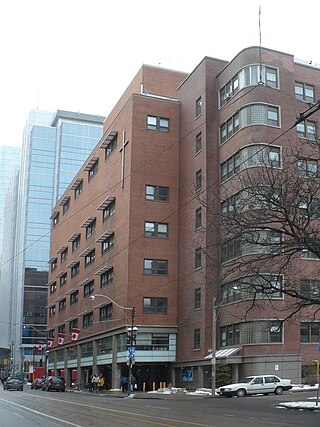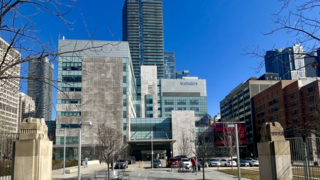Related Research Articles

A think tank, or policy institute, is a research institute that performs research and advocacy concerning topics such as social policy, political strategy, economics, military, technology, and culture. Most think tanks are non-governmental organizations, but some are semi-autonomous agencies within government, and some are associated with particular political parties, businesses or the military. Think tanks are often funded by individual donations, with many also accepting government grants.

David Edward Crombie is a former Canadian academic and politician who served as the 56th mayor of Toronto from 1972 to 1978. Crombie was elected to Parliament following his tenure as mayor. A member of the Progressive Conservative (PC) Party, he served as minister of national health and welfare from 1979 to 1980, minister of Indian affairs and northern development from 1984 to 1986, and secretary of state for Canada from 1986 to 1988.
The Yee Hong Centre for Geriatric Care in Toronto, Ontario, Canada, is a residential community for senior citizens, particularly those unable to care for themselves.

Homelessness in Canada was not a social problem until the 1980s. The Canadian government housing policies and programs in place throughout the 1970s were based on a concept of shelter as a basic need or requirement for survival and of the obligation of government and society to provide adequate housing for everyone. Public policies shifted away from rehousing in the 1980s in wealthy Western countries like Canada, which led to a de-housing of households that had previously been housed. By 1987, when the United Nations established the International Year of Shelter for the Homeless (IYSH), homelessness had become a serious social problem in Canada. The report of the major 1987 IYSH conference held in Ottawa said that housing was not a high priority for government, and this was a significant contributor to the homelessness problem. While there was a demand for adequate and affordable housing for low income Canadian families, government funding was not available. In the 1980s a "wider segment of the population" began to experience homelessness for the first time – evident through their use of emergency shelters and soup kitchens. Shelters began to experience overcrowding, and demand for services for the homeless was constantly increasing. A series of cuts were made to national housing programs by the federal government through the mid-1980s and in the 1990s. While Canada's economy was robust, the cuts continued and in some cases accelerated in the 1990s, including cuts to the 1973 national affordable housing program. The government solution for homelessness was to create more homeless shelters and to increase emergency services. In the larger metropolitan areas like Toronto the use of homeless shelters increased by 75% from 1988 to 1998. Urban centres such as Montreal, Laval, Vancouver, Edmonton, and Calgary all experienced increasing homelessness.

James Fraser Mustard was a Canadian doctor and renowned researcher in early childhood development. Born, raised and educated in Toronto, Ontario, Mustard began his career as a research fellow at the University of Toronto where he studied the effects of blood lipids, their relation to heart disease and how Aspirin could mitigate those effects. He published the first clinical trial showing that aspirin could prevent heart attacks and strokes. In 1966, he was one of the founding faculty members at McMaster University's newly established medical school. He was the Dean of the Faculty of Health Sciences and the medical school at McMaster University from 1972 to 1982. In 1982, he helped found the Canadian Institute for Advanced Research and served as its founding president, serving until 1996. He wrote several papers and studies on early childhood development, including a report used by the Ontario Government that helped create a province-wide full-day kindergarten program. He won many awards including being made a companion of the Order of Canada – the order's highest level – and was inducted into the Canadian Medical Hall of Fame. He died November 16, 2011.
The Munk School of Global Affairs and Public Policy at the University of Toronto is an interdisciplinary academic centre. It offers various research and educational programs related to the field of globalization. It is located in Toronto, Ontario, offers master's degrees in global affairs and public policy, and a master's degree in European, Russian and Asia-Pacific studies. This school is a member of the Association of Professional Schools of International Affairs (APSIA). It also works in group of schools that educate students in international affairs. The Munk School's Master of Global Affairs program typically receives 500 and 600 applicants per year and offers 80 students entry into its program.

The C. D. Howe Institute is a public policy think tank in Toronto, Ontario, Canada. It aims to be distinguished by "research that is nonpartisan, evidence-based, and subject to definitive expert review." The institute's office is located in the Trader's Bank Building in downtown Toronto.

The Urban Institute is a Washington, D.C.–based think tank that conducts economic and social policy research to "open minds, shape decisions, and offer solutions". The institute receives funding from government contracts, foundations, and private donors.

St. Michael's Hospital is a teaching hospital and medical centre in Toronto, Ontario, Canada. It was established by the Sisters of St. Joseph in 1892 with the founding goal of taking care of the sick and the poor of Toronto's inner city. The hospital provides tertiary and quaternary services in cardiovascular surgery, neurosurgery, inner city health, and therapeutic endoscopy. It is one of two Level 1 adult trauma centres in Greater Toronto, along with the larger Sunnybrook Health Sciences Centre. As trauma centres, both St. Michael's and Sunnybrook are equipped with helipads. It is one of several teaching hospitals of the University of Toronto Faculty of Medicine and is part of the Unity Health Toronto hospital network.

Toronto Community Housing Corporation (TCHC) is a public housing agency in Toronto, Ontario. It is the largest social housing provider in Canada with over 58,000 units across 2,100 buildings and approximately 105,000 residents. It is the second-largest housing provider in North America, behind the New York City Housing Authority.

Women's College Hospital is a teaching hospital in Toronto, Ontario, Canada. It is located in downtown Toronto at the north end of Hospital Row, a section of University Avenue where several major hospitals are located. It currently functions as an independent ambulatory care hospital.
The Wellesley Hospital was a teaching hospital in Toronto, Ontario, Canada, affiliated with the University of Toronto. It was founded by Dr. Herbert Bruce as a private hospital, but became publicly operated in 1942.
Michael Shapcott is Executive Director of the Sorrento Centre, a retreat and conference centre in the Shuswap region of British Columbia, Canada, that offers in-person and on-line events and activities. Previously, he served as Director of National Business and Community Strategy for Prince's Charities Canada.
Canadian Policy Research Networks (CPRN) was a non-profit, non-partisan socio-economic think tank based in Ottawa, Ontario, Canada, with a focus on citizen engagement and policy research and analysis.
Energy Probe is a non-governmental social, economic, and environmental policy organization based in Toronto, Canada known recently for denying man-made climate change.
Stephen Gaetz, is the director of the Canadian Observatory on Homelessness (COH) and a professor at the Faculty of Education at York University in Toronto, Ontario, Canada. Dr. Gaetz has enhanced pan-Canadian collaboration between stakeholders interested in homelessness research in Canada.
The Mowat Centre was an independent Canadian public policy think tank associated with the Munk School of Global Affairs and Public Policy at the University of Toronto. It was established in 2009 with support from the government of Ontario, and published its first report in February 2010. It closed in June of 2019 after its funding agreement with the Government of Ontario was cancelled. It was named after Ontario's longest-serving Premier, Sir Oliver Mowat.

The Canada West Foundation is a conservative non-partisan think tank based in Calgary, Alberta. It researches issues of concern in British Columbia, Alberta, Saskatchewan, and Manitoba and issues of national significance.

Kwame Julius McKenzie is a British-Canadian psychiatrist employed as the CEO of Wellesley Institute, a policy think tank based in Toronto, Ontario. McKenzie is a full professor in the Department of Psychiatry at the University of Toronto. He has worked as physician, researcher, policy advisor, journalist and broadcaster.
References
- 1 2 Hollobon, Joan (1987). The Lion's Tale: A History of the Wellesley Hospital . Toronto, ON: Irwin Publishing. p. 1. ISBN 0772512205.
- ↑ Godfrey, Charles (2001). Bruce: surgeon, soldier, statesman, sonofa. Madoc, ON: Codam Publishers. p. 200. ISBN 0-9684226-1-6.
- 1 2 3 Goyette, David; Dennis William Magill; Jeff Denis (2006). Survival Strategies: The Life, Death and Renaissance of a Canadian Teaching Hospital. Toronto, ON: Canadian Scholars' Press Inc. p. 322. ISBN 1-55130-304-3.
- ↑ "CAMH News & Stories".
- ↑ "Welcoming Our New CEO". 21 March 2014.